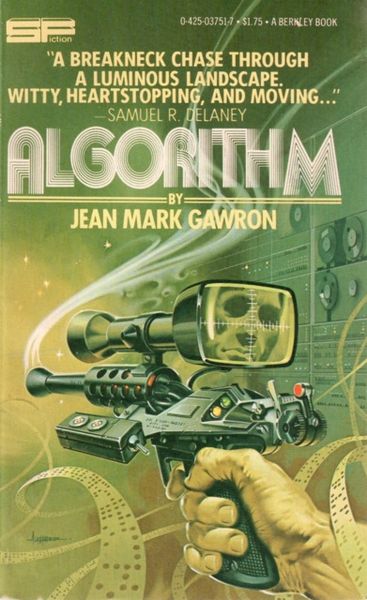Each Careful Step
Algorithm
By Jean Mark Gawron

19 Mar, 2024
Jean Mark Gawron’s 1978 Algorithm is a stand-alone science fiction novel.
ASSASSIN! A word that demands all caps and frequent repetition on the Earth of the day after tomorrow.
Who is the assassin? Who is their target? Can the assassin be stopped?
The Earth is a backwater world, renowned in the planets of Way Up There as a tourist attraction offering fleshy delights. However, the Novak Equations (Novak being this world’s answer to Einstein, Chomsky, and Hari Seldon) strongly suggest that another period of conflict between worlds looms. An assassin has been sent to steer Earth in a favored direction by eliminating an influential person.
On another planet, the target would be a government figure or perhaps a warlord. On anarchist Earth, there is no government to speak of. While Earth abounds in retail violence on the slenderest of pretexts, the age of the mercenaries ended bloodily decades ago. Earth’s influential figures are the “proets,” artists weaving words and other arts to the delight of the public.
Danton is a proet. His name is high on the list of possible targets. However, he is but one of twenty-five people deemed significant enough to be worth murdering. Armed with insightful linguistics, art, and of course actual weapons, Danton and his friends and allies set out to expose the would-be assassin and confound their plan… whatever it is.
~oOo~
Welcome to the second round of my latest reviewing project, What’s The Worst That Could Happen. As you know, Bob, the books covered in this series are either notoriously terrible or notoriously difficult. The debut novel, They’d Rather Be Right, was terrible. Algorithm is better known, to the extent that it’s remembered at all, for being difficult.
A minor mystery: I thought Algorithm was a famously opaque SF novel. However, I can find little evidence that anyone reviewed it back in 1978. Am I simply remembering conversations on rec.art.sf.written and its predecessors?
I want to call Algorithm proto-cyberpunk, although I don’t know that that stands up. Public institutions are defunct in this setting; there really isn’t any analog to the powerful oligarchs and corporations of cyberpunk.
Curiously, there are parallels between this and Cecilia Holland’s 1975 Floating Worlds, something I overlooked the first time I read Algorithm. Both involve anarchist Earth facing off-world threats. Neither one makes a strong case that anarchy would be particularly effective at protecting the Earth [1]. The books are very different in most ways, but the similarities are tantalizing. Or at least unexpected.
Readers may also be reminded of Kadrey’s 1988 Metrophage, which shares with Algorithm a strong element of “the Fascists are at the door! Fill the bathtub with brightly colored machine-parts!” [2] Not to mention populating their respective novels with characters I would not trust to open a Kinder Egg, never mind protecting the Earth from threats, extra-terrestrial or otherwise.
The model the author may have had in mind is likely none of the works mentioned above. Gawron is, among other things, a Samuel R. Delany aficionado. Thus, it would not be astonishing if Algorithm were Gawron’s attempt to follow where works like Triton led.
So, underappreciated classic or an example of Disco-Era wretched excess? A bit of column A and a bit of column B. In column A, kudos for literary ambition! Gawron makes no attempt to cater to fans of conventional SF. In column B, if you’re going to demand heavy lifting from the reader, there really should be more there to justify the effort than self-important, incompetent characters and a meandering plot. A cynic might describe the prose as less ambitious than obfuscatory. However, the book stands head and shoulders over They’re Rather Be Right because the flaws here are those of ambition exceeding execution, not merely a desire to assemble tropes into a pile that would appeal to a specific editor.
I will freely grant this could be one of those books I am too stupid to properly appreciate. Unfortunately, to paraphrase American philosopher Rumsfeld, one reads books with the brain and body of experience you have, not the brain and body of experience you might want or wish to have later [3]. I think I got more out of this than I did back in 1978. I can’t say I particularly enjoyed or would recommend the experience.
Algorithm is out of print.
1: I might attribute neither book getting a Prometheus Award nod to my impression that the Prometheus crowd prefers their anarchists less ineffective than those featured in Floating Worlds and Algorithm, but that is unfair. Far more relevant is the fact that both books precede the Prometheus Award.
2: The proets take their ability to fight the man using linguistic analysis, art, and casual violence more seriously than the results support. It no doubt reflects poorly on me that the character that kept coming to mind was The Young One’s people’s poet, Rick.
3: My confidence that the issue is not entirely my deficiencies as a reader is bolstered by Clute’s SFE entry for Gawron, which reads in part
Some exceedingly ambitious sf ideas have tended, in Gawron’s work, to fall short of their full affect, through a prose style which can be inattentive to basics.
If anyone in SF were likely to enjoy what Gawron is attempting, it would be John Clute.
